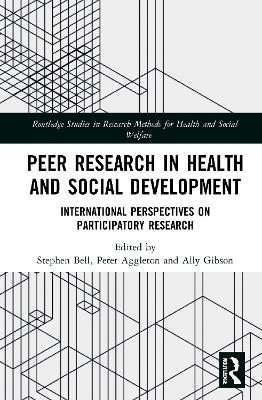
Peer Research in Health and Social Development
Routledge (Verlag)
978-0-367-32139-0 (ISBN)
Critics, however, point to methodological concerns with peer research. These include the extent to which peer researchers genuinely represent the populations under study; data confidentiality; the emotional burden of enquiring into sensitive issues peers may experience in their own lives; and the reliability and credibility of data collected by people who do not have academic training. The book seeks to counter the marginalisation of research experience and skills derived from close relationships with people and communities, while reflecting critically on the strengths and limitations of peer research. Chapters by a wide range of international contributors illustrate the potential of peer research to facilitate an in-depth understanding of health and social development issues and enhance policy and practice.
This interdisciplinary book provides students and professionals working in health, social science and development studies with a thorough grounding in this new style of research. It will appeal to those interested in research and evaluation; sexual health and public health; mental health, disability and social care; gender and sexuality; conservation and environmental management; migration and citizenship studies; humanitarian issues; and international development.
Stephen Bell is an associate professor in the Poche Centre for Indigenous Health and the School of Public Health at the University of Queensland, Australia. He is a social scientist who has conducted community-based research – in partnership with young people and other marginalised populations – in Africa, Asia, Pacific-Asia and Australia. The focus of his work is on sexual, reproductive and maternal health, HIV and other public health issues. His previous co-edited book (with Peter Aggleton), Monitoring and Evaluation in Health and Social Development: Interpretive and Ethnographic Approaches, was published by Routledge in 2016. Peter Aggleton holds senior professorial positions in the Centre for Social Research in Health at UNSW Sydney, the School of Sociology at The Australian National University in Canberra, the Australian Research Centre for Sex, Health and Society at La Trobe University in Melbourne, and the Centre for Gender and Global Health at UCL in London. In addition to his academic work, Peter has served as a senior adviser to UNAIDS, UNESCO, UNFPA and WHO. He has worked extensively across Africa, Asia and Latin America. Ally Gibson is a lecturer in the School of Health at Victoria University of Wellington – Te Herenga Waka, New Zealand. She is particularly interested in experiences and responses to cancer; sexual and reproductive health; gender, sexuality and identity; and inequity, marginalisation and vulnerability in health. A key priority in her research is to partner with community organisations to promote enquiry driven by the needs and priorities of individuals and community members.
Part I-Critical Perspectives on Peer Research 1.Peer research in health and social development: understandings, strengths and limitations 2.From the researched to the researcher: decolonising research praxis in Papua New Guinea 3.Principled tensions when working with peer researchers: community-based participatory research with five Pacific Islander communities in Southern California 4.The limits of peer research? Reflecting on analytic challenges during health and social development programme research in Rwanda, Nepal, Ecuador and Uganda Part II-Working with hard to reach participants 5.People with dementia as peer researchers: understanding possibilities and challenges 6.Gender diverse equality and wellbeing in Manipur, North East India: reflections on peer-led research 7.Co-constructing knowledge about the wellbeing outcomes of unaccompanied migrant children becoming ‘adult’ 8.Participation and power: engaging peer researchers in preventing gender-based violence in the Peruvian Amazon Part III- Understanding diverse issues 9.Participatory visual research exploring gender and water in Cameroon: a workshop model 10.‘I am the bridge’: peer research with women with disabilities in the Philippines and Australia 11.Reflecting on the role of peer researchers in collaborative Indigenous food security research in the Inuvialuit Settlement Region, Canada Part IV- Ethical considerations 12.Socio-ethical considerations in peer research with newly arrived migrant and refugee young people in Denmark: reflections from a peer researcher 13.The ethical dilemmas of working safely with community researchers: lessons from community-based research with lesbian, gay, bisexual, transgender and queer communities 14.Blurred lines: treading the path between ‘research’ and ‘social intervention’ with peer researchers and participants in a study about youth health in South Africa Part V- Influencing policy and practice 15.Farmer-led change: addressing environmental and health problems caused by widespread pesticide use in Costa Rica, Nicaragua and Honduras 16.Using empowering methods to research empowerment? Peer research by girls and young women in Kinshasa, Democratic Republic of Congo 17.Lessons learned from Australian case studies of sex workers engaged in academic research about sex worker health, wellbeing and structural impediments 18.The lasting impact of peer research with Indigenous communities of Guyana, South America
| Erscheinungsdatum | 28.04.2021 |
|---|---|
| Reihe/Serie | Routledge Studies in Health and Social Welfare |
| Zusatzinfo | 1 Line drawings, black and white; 1 Illustrations, black and white |
| Verlagsort | London |
| Sprache | englisch |
| Maße | 156 x 234 mm |
| Gewicht | 453 g |
| Themenwelt | Sachbuch/Ratgeber ► Gesundheit / Leben / Psychologie |
| Studium ► Querschnittsbereiche ► Prävention / Gesundheitsförderung | |
| Sozialwissenschaften ► Pädagogik ► Sozialpädagogik | |
| Sozialwissenschaften ► Soziologie | |
| ISBN-10 | 0-367-32139-4 / 0367321394 |
| ISBN-13 | 978-0-367-32139-0 / 9780367321390 |
| Zustand | Neuware |
| Informationen gemäß Produktsicherheitsverordnung (GPSR) | |
| Haben Sie eine Frage zum Produkt? |
aus dem Bereich


